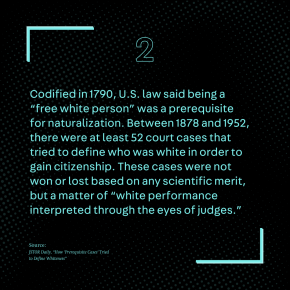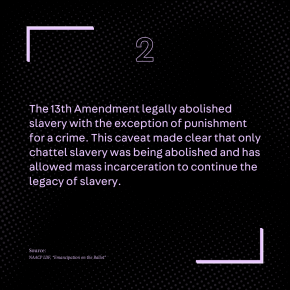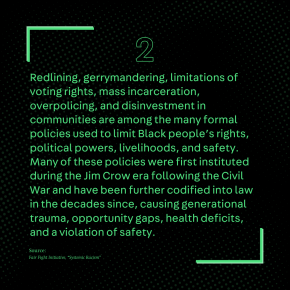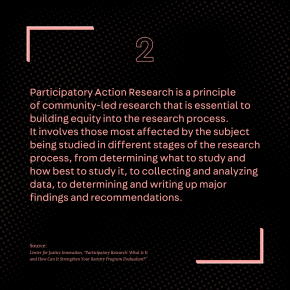Celebrating Black History Month

Critical Race Theory (CRT) is a framework used in academic and legal contexts that interrogates the role of race and racism in society.
This evolving practice critiques how the social construction of race has institutionalized racism. CRT emerged from the legal academy and has spread to other disciplines to help inform how we look at our systems and policies.
CRT teaches us about the role that racism plays in society. As CRT and Black history are being banned across the country, we at the Center for Justice Innovation are honoring Black History Month by unpacking how these principles are central to achieving more just outcomes. Throughout our history, CRT has informed facets of our work:
- In our research, we document racial disparities in arrest, incarceration, and system involvement, and offer effective solutions.
- In the legal system, we build responses that create more equitable outcomes for people.
- In our work with communities that have faced historical disinvestment, we co-create sustainable approaches to safety and security.
Read on to learn more about the tenets of CRT (per the American Bar Association, informed by scholar Khiara M. Bridges), how they have manifested throughout history, and why understanding them is essential to creating a fairer, more humane world inside and outside of our legal system.
Tenet 1
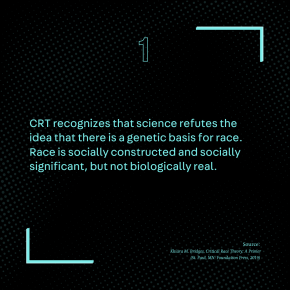
Source: Khiara M. Bridges, Critical Race Theory: A Primer (St. Paul, MN: Foundation Press, 2019)
Resource: The Human Genome Project
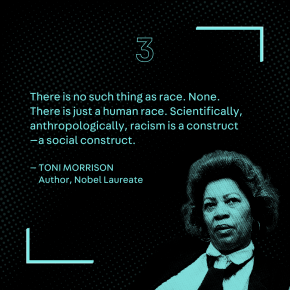
"There is no such thing as race. None. There is just a human race. Scientifically, anthropologically, racism is a construct—a social construct." – Toni Morrison
Toni Morrison was an American author, Pulitzer Prize winner, and Nobel Laureate in Literature. She was a professor at Howard University for seven years before joining a publishing house where she edited fiction for Black authors. After switching to writing her own novels, her second novel Sula was nominated for the National Book Award and she became a household name by her third book. Her work has influenced writers and artists through her focus on African American life and her commentary on race relations.
Here are some of Toni Morrison’s acclaimed novels:
The Bluest Eye (1970)
Sula (1973)
Song of Solomon (1977)
Tar Baby (1981)
Beloved (1987)
Jazz (1992)
Paradise (1997)
Love (2003)
A Mercy (2008)
God Help the Child (2015)
We are committed to combating all forms of oppression—including white supremacy, racism, sexism, homophobia, transphobia, ableism, and classism—within our organization, communities, and justice systems. Acknowledging that race is a social construct is key to understanding the truth behind racism and how it manifests in our society. We specifically recognize and condemn racism and its role in shaping policies in the legal system.
Tenet 2
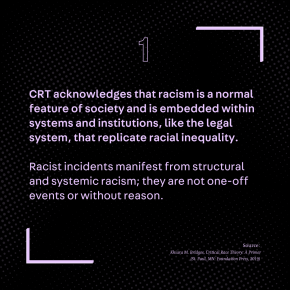
Source: Khiara M. Bridges, Critical Race Theory: A Primer
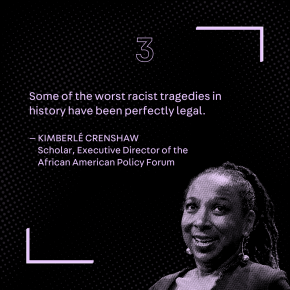
"Some of the worst racist tragedies in history have been perfectly legal." – Kimberlé Crenshaw
Kimberlé Crenshaw is a leading scholar and writer on critical race theory, civil rights, Black feminist legal theory, and connections between racism and the law. A pioneer in theory, Crenshaw coined the term “intersectionality” and her work has led to identifying key issues, including the “school to prison pipeline.” Crenshaw co-founded and leads the African American Policy Forum, founded and leads the Center for Intersectionality and Social Policy Studies, and is a law professor at both Columbia and UCLA.
Here are some of the works that Kimberlé Crenshaw has written or contributed to:
Words that Wound: Critical Race Theory, Assaultive Speech and the First Amendment (1993)
Critical Race Theory: The Key Writings That Formed the Movement (1995)
Seeing Race Again: Countering Colorblindness across the Disciplines (2019)
The Race Track: How The Myth of Equal Opportunity Defeats Racial Justice (2022)
Racialized policies have disproportionately impacted Black communities. Current approaches to law enforcement and safety have made Black people more likely to be arrested, convicted of crimes, and serve longer jail and prison sentences.
Our research documents where and how these racial disparities exist:
- Black people represent 60% of the New York jail population, according to a report on Rikers from 2021. The same proportion continues to exist today.
- Judges have been seen to be almost 50% more likely to set bail on Black people accused of violent felony charges than on white people facing identical charges.
- 50% of people charged with misdemeanors—the majority of criminal cases in the U.S.— are Black, more than twice their representation in the city’s general population.
- Black people are often left out of diversion programming, increasing racial disparities in those cities’ jails.
- Black and Hispanic New Yorkers make up 91% of arrests qualifying for mandatory minimum sentences, with white people making up only 7% of such arrests.
Our work within the legal system creates more equitable responses for people by:
- Prioritizing treatment over incarceration.
- Addressing people's underlying needs like mental health and housing through community courts.
- Reducing incarceration through alternatives to incarceration and diversion programming.
Tenet 3
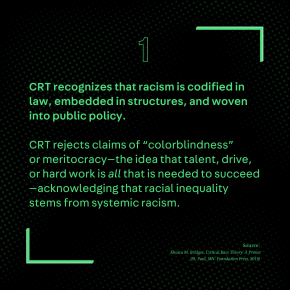
Source: Khiara M. Bridges, Critical Race Theory: A Primer
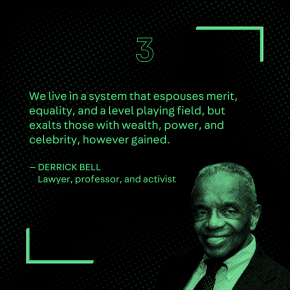
“We live in a system that espouses merit, equality, and a level playing field, but exalts those with wealth, power, and celebrity, however gained.” – Derrick Bell
Derrick Bell was a distinguished legal scholar, writer, and champion for equality. He helped develop critical race theory and worked to expose the persistence of racism through his five-decade career. On faculty at several law schools across the country, Bell resigned many positions to protest exclusive hiring practices. He also worked in the Civil Rights Division of the Justice Department and served as assistant counsel for the NAACP Legal Defense Fund, where he administered 300 desegregation cases in Southern schools and restaurant chains in the early 1960s.
Here are some of the works that Derrick Bell has contributed to, or have been written about him:
Race, Racism, and American Law (1970)
The Age of Segregation: Race Relations in the South, 1890-1945 (1978)
And We Are Not Saved (1989)
Faces at the Bottom of the Well (1992)
Silent Covenants: Brown v. Board of Education and the Unfulfilled Hopes for Racial Reform (2004)
The Man Behind Critical Race Theory (New Yorker, 2021)
Community members are experts in their own neighborhoods and should define for themselves what safety is and identify what resources are needed to achieve it. However, community safety and justice decisions are often exclusively in the hands of police, prosecutors, and other institutional players rather than in their own hands, which contribute to feelings of reduced safety and increased stress for many residents, particularly Black men.
Our community-based work in violence prevention, community courts, street outreach, housing security, and more all build power within communities to create more authentic and equitable approaches to safety.
Tenet 4
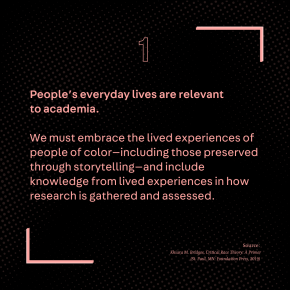
Source: Khiara M. Bridges, Critical Race Theory: A Primer
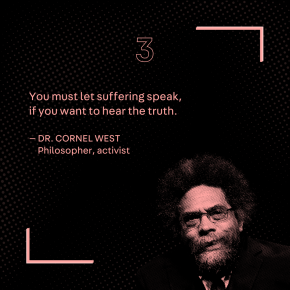
“You must let suffering speak, if you want to hear the truth.” – Cornel West
Dr. Cornel West is a philosopher, activist, and social critic. His primary focus is on the role of race, gender, and class in American society. Dr. West taught philosophy, religion, and African American studies at several colleges and universities and was appointed Alphonse Fletcher, Jr., University Professor at Harvard.
Here are some of Dr. West’s works:
Race Matters (1993)
Democracy Matters (2004)
The Rich And The Rest Of Us: A Poverty Manifesto (2012)
Black Prophetic Fire (2014)
People are experts in their own lives and experiences, and communities have cultural practices and wisdom that are often passed down for generations. We believe in community-led investigation and make room for these perspectives in all aspects of our research practices.
From ensuring that people with lived experience are part of the research team through participatory action research, to advocating for using community-level metrics and questioning the value placed on criminal legal system data, we are re-imagining research through the lens of those affected to more accurately evaluate the multidimensional nature of community safety.


